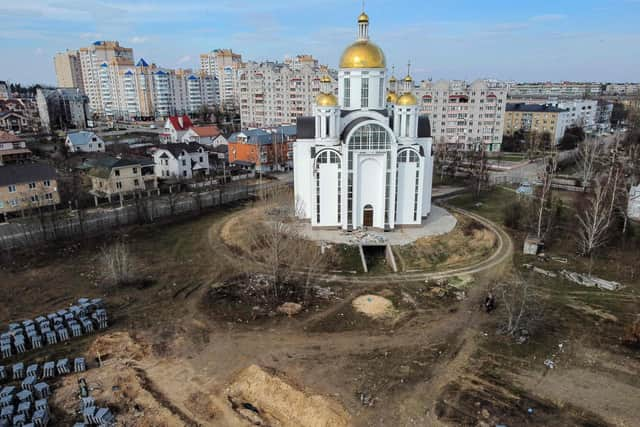Now 90% of victims of weapons of war are civilians – international law must react to this new reality - Stewart McDonald
Morgenthau, one of the twentieth century’s foremost scholars of international relations, believed the state was the highest authority on the international stage, making the creation and enforcement of international law far more difficult than in a domestic context.
A brief comparison between the US Constitution and the UN Charter illustrates his point. The US Constitution, as those of who have followed the raging debate on gun control with horror will know, is the subject of constant discussion and revising in the United States.
Advertisement
Hide AdAdvertisement
Hide AdSince its drafting, the constitution has been subject to 27 amendments which have covered everything from abolition of slavery and the right of women to vote to the national prohibition of alcohol and the creation of presidential term limits – reforms which have transformed power relations within the United States and changed the way its citizens live their daily lives.


In contrast, the UN Charter appears to be fixed in aspic. Since its drafting in 1945 – admittedly almost 200 years later than the US Constitution – the founding text of the United Nations has seen only five changes made. Four of these were to expand internal bodies like United Nations Security Council or the Economic and Social Council as more states joined and the single qualitative amendment to the UN Charter in 1968 was, ironically, to change the requirements for amending the Charter. After that, and one more for another increase in the
size of the Economic and Social Council in 1973, the UN Charter has not been updated since.
Who could not argue that the world has been transformed since 1945? Not only have the powers of the world waxed and waned, with countries like India and Germany having emerged as influential global actors just as Russia becomes an international pariah, but the technologies states use today to wage war would have been unimaginable to those drafting the charter in 1945.
For centuries, battlefields looked like the Somme. They were distant fields, far from towns and cities, where men fought and died. Today’s wars, however, are waged predominantly in urban environments where civilians are increasingly forced into the firing line. Across the
world, cities which have stood for centuries – Aleppo, Bucha, Gaza, Mosul – are now synonymous with the murder of innocent people in their living rooms and on the streets of their home.
Yet long after this horrifying development has become the norm in modern conflict, international law has struggled to adapt. As war returns to the European continent, it does so in a new way – with new weapons and new methods of killing without a human being ever needing to step foot on the battlefield.
And just as these new forms of warfare emerge, the international order which must regulate them is at risk: both from the unprecedented assault from rogue states like Putin’s Russia but also from the gentle erosion of its relevance through a lack of enforcement.
Advertisement
Hide AdAdvertisement
Hide AdIndeed, this was the topic of discussion when I took part in negotiations to limit the use of explosive weapons in populated areas at the UN in Geneva this week. Now, 90% of the victims of these weapons, designed mostly for open battlefields rather than populated areas, are civilians. We are seeing it now in Ukraine, with Russian forces targeting people’s homes, schools, hospitals, and train stations.
Thomas Jefferson, author of the US Constitution, argued to the end of his days that the text he had drafted was a “living document” to be shaped and updated by every generation so that it may remain as relevant to them as it was to its drafters. No society, he argued “can make a perpetual constitution, or even a perpetual law”.
Jefferson’s centuries-old warning was right. The well-meaning drafters of laws and norms around the use of force in international relations created an international system born from the ashes of the Second World War and respected by those who remembered its horrors. As that generation passes, the system they created must continue to be strengthened.
In the absence of a universally accepted hierarchy of power in international relations, Morgenthau argued that states must assume responsibility for the creation and enforcement of international law. It is not enough to create an international architecture of treaties and
agreements then leave it to wither and rot under an empty sky.
States must nurture and update these treaties to not only make them relevant to the modern international system, but actively enforce them.
Words on a page will not bring about world peace. The UN is and will remain the foremost architect of an international order which can create and preserve peace among nations – but only if these rules are enforced by states.
If we believe that an enforceable system of international laws, norms and treaties are the best way to keep us free and at peace, then we must be willing to not only defend that system from the assault it is currently under, but ensure we breathe new life into it to be robust enough for the moment we find ourselves in. That will take leadership.
Advertisement
Hide AdAdvertisement
Hide AdFrom the use of chemical weapons in Syria to Putin’s war of aggression against his neighbours, global leaders have broken international law with little or no meaningful consequences. Just last month, the Prime Minister described Saudi Arabia – a state which orchestrated the murder of a journalist and the dismemberment of his corpse – as a “key international partner”.
Putin’s abhorrent crimes in Ukraine did not emerge from nowhere: he saw that the international rules-based order has been freely violated by many – including himself – for years and that no consequences were ever faced. This age of impunity must end.
Stewart McDonald MP is the SNP spokesperson on Defence
